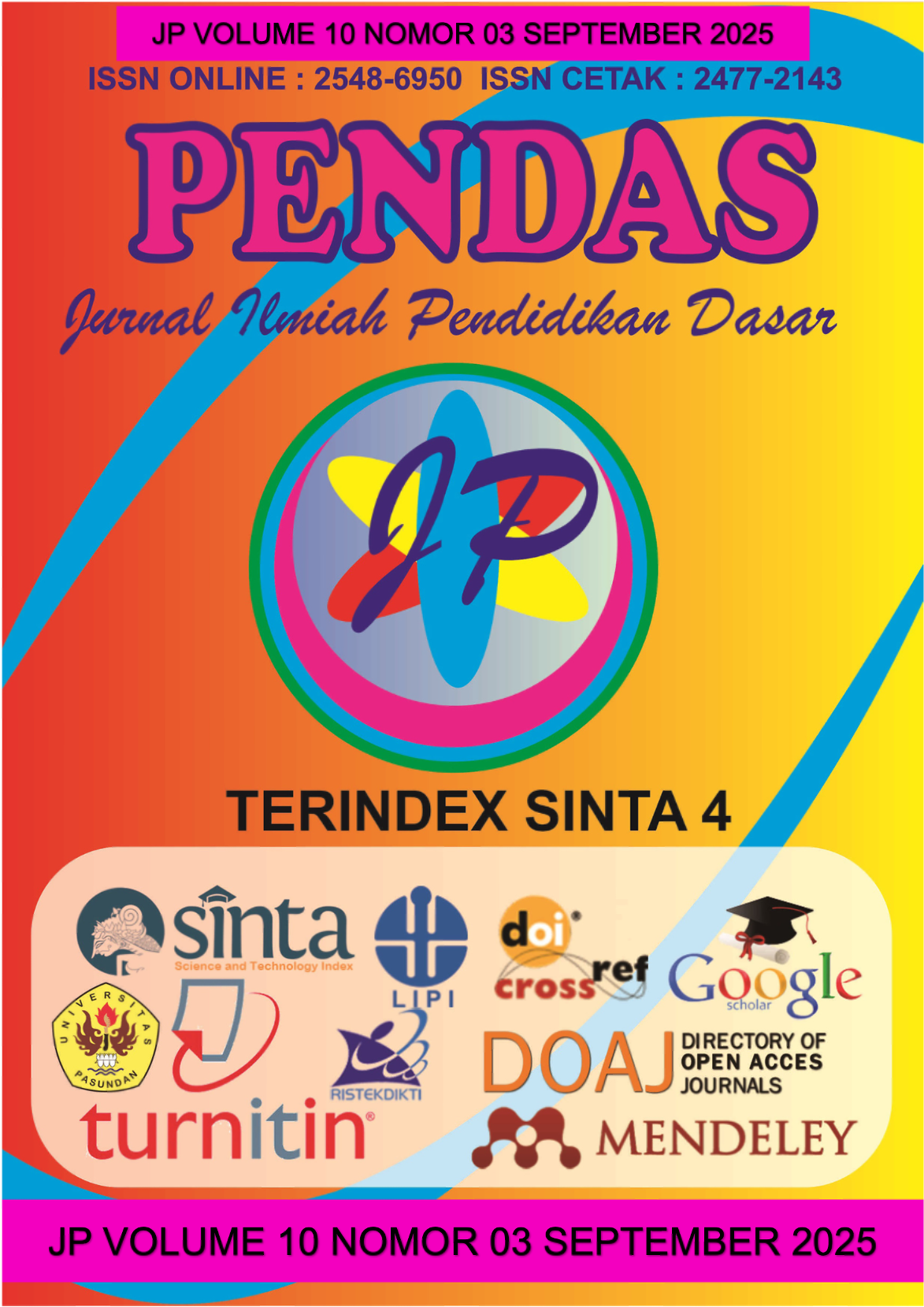Efektivitas Model Pembelajaran Word Square Terhadap Hasil Belajar IPS Siswa Kelas III Madrasah Ibtidaiyah Ma’had Al-Zaytun
DOI:
https://doi.org/10.23969/jp.v10i03.33848Keywords:
effectiveness, learning model, word square, social studies learning outcomesAbstract
The purpose of this study was to determine the effectiveness of the Word Square learning model on the learning outcomes of social studies of grade III students of Madrasah Ibtidaiyah Ma'had Al-Zaytun. This study applies a quantitative method with the type of One-Group Pretest-Posttest research. Data collection is in the form of tests, questionnaires and documentation. To determine the effectiveness of the Word Square learning model on social studies learning outcomes, a hypothesis test in the form of a Paired Sample T-Test and an N-Gain Score test was used. The sample in this study was taken using the Non Probability Sampling technique, namely one class III B01 with 20 students. The results of the study indicate that the Word Square learning model is effective on the learning outcomes of social studies of grade III students of Madrasah Ibtidaiyah Ma'had Al-Zaytun, with the results of the Paired Sample T-Test sig 2 tailed value of 0.000 <0.05. Then the effectiveness of the Word Square learning model on the learning outcomes of social studies students of class III of Madrasah Ibtidaiyah Ma'had Al-Zaytun was proven through the results of the N-Gain Score test with a High criterion of 0.72 and the acquisition of questionnaire data with interpretation criteria that were classified as Strong at 61%.
Downloads
References
Ahlaro, S. R. (2020). Kriteria Metode Pembelajaran yang Baik dan Efektif. Jurnal JUMPA, 8(1).
Asyafah, A. (2019). Menimbang Model Pembelajaran (Kajian Teoretis-Kritis atas Model Pembelajaran dalam Pendidikan Islam). Indonesian Journal of Islamic Education, 6(1), 19–32. https://doi.org/10.17509/t.v6i1.20569
Fajrin, R., Sutrisno, S., & Reffiane, F. (2021). Model Kooperatif Tipe Word Square Meningkatkan Hasil Belajar Siswa. Journal for Lesson and Learning Studies, 4(1), 102–106.
Hafizh, M., Dewi, Y., Arifmiboy, & Afrinaldi. (2024). Pengaruh Mind Mapping dan Motivasi Peserta Didik dalam Meningkatkan Hasil Belajar Pendidikan Agama Islam. Jurnal Kependidikan Islam, 10(2).
Hayati, M., Zakir, S., M, I., & Sesmiarni, Z. (2024). Pengembangan E-Modul Berbasis Flipbook untuk Meningkatkan Hasil Belajar Pendidikan Agama Islam Peserta Didik SMA. Jurnal Kependidikan Islam, 10(2).
Oktavia, M., Prasasty, A. T., & Isroyati. (2019). Uji Normalitas Gain Untuk Pemantapan dan Modul dengan One Group Pre and Post Test. https://doi.org/10.30998/simponi.v0i0.439
Putri, L. E., & Hadi, D. (2023). Hubungan Kematangan Emosi Dengan Penyesuaian Diri Pada Pembelajaran Tatap Muka Siswa Kelas X di MAN 3 Tulungagung. Jurnal Edukasi: Jurnal Bimbingan Konseling, 9(1), 24–41. https://doi.org/10.22373/je.v9i1.13064
Rizkia, N. M., & Hanik, E. U. (2022). Implementasi Model Pembelajaran Word Square Berbantuan Media Busy Book dalam Pembelajaran Bahasa Indonesia Kelas III SDN 08 Kedungsari Gebog Kudus. Jurnal Sekolah Dasar, 7(1), 83–102. https://doi.org/10.36805/jurnalsekolahdasar.v7i1.3047
Rohmawati, A. (2015). Efektivitas Pembelajaran. Jurnal Pendidikan Usia Dini, 9(1). https://doi.org/10.21009/JPUD.09
Salsabila, Y., & Sunarti, S. (2021). Pengaruh Motivasi Belajar dan Sarana Prasarana Terhadap Prestasi Belajar Siswa Kelas. Educare: Jurnal Penelitian Pendidikan Dan Pembelajaran, 1(1), 1–5.
Downloads
Published
Issue
Section
License
Copyright (c) 2025 Pendas : Jurnal Ilmiah Pendidikan Dasar

This work is licensed under a Creative Commons Attribution 4.0 International License.














































